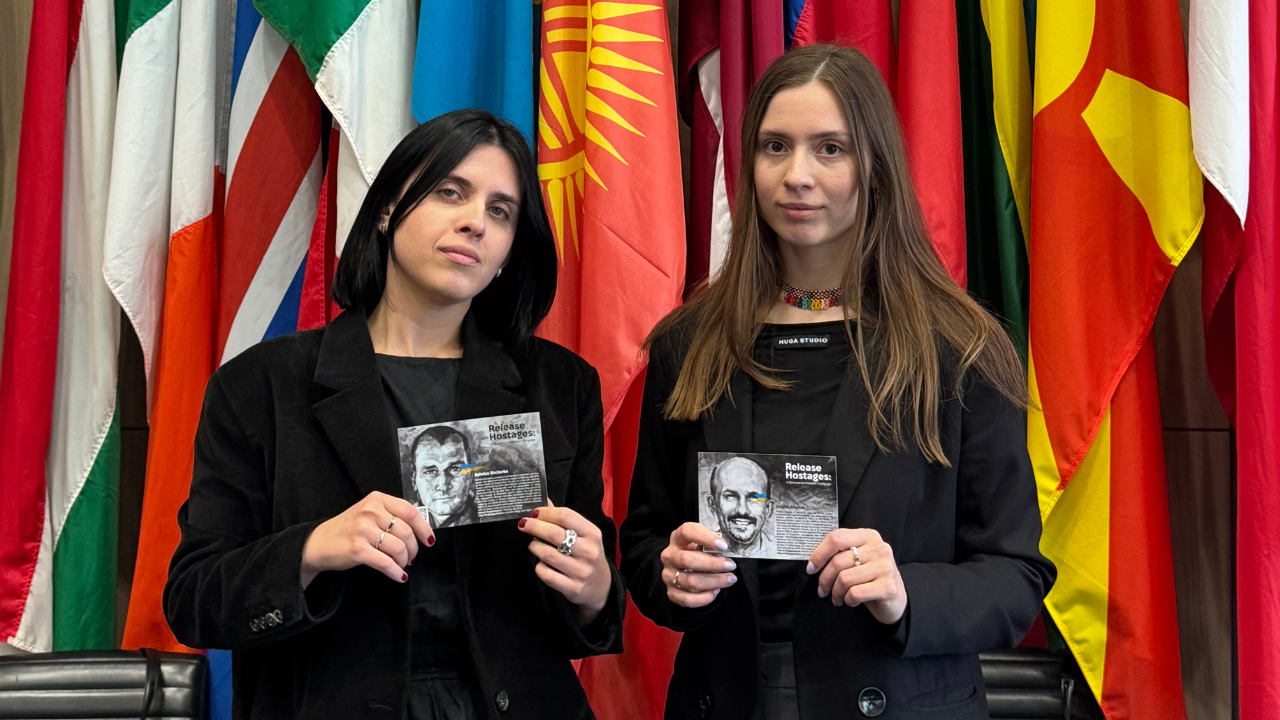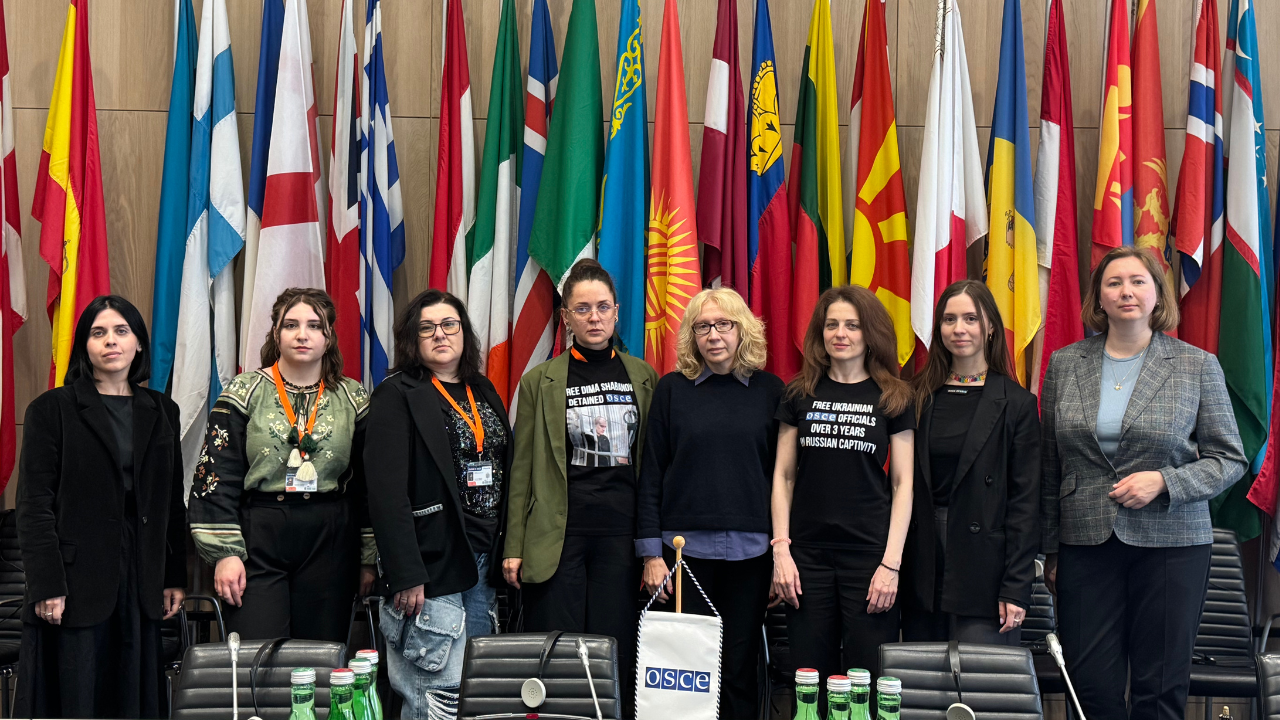Ukrainian human rights activists propose a new tactic for the OSCE to free Ukrainian civilians abducted by Russia

Torture, isolation, murder, and gloom of Russian prisons. In Vienna, Ukrainian human rights activists told the world about the fate of thousands of civilians who have become hostages of the occupation regime. The focus was on the stories of illegally detained journalists, mayors, activists, and new proposals for their release.
The special event at the OSCE was organized by the Media Initiative for Human Rights in cooperation with the Ukrainian Legal Advisory Group (ULAG), Human Rights Center ZMINA, and the Crimean Human Rights Group. The initiative was supported by the Permanent Mission of Ukraine to the International Organizations in Vienna and was attended by more than 35 representatives of OSCE participating states, including Canada, Norway, Italy, the United Kingdom, Sweden, the United States, and others.

Special event of Ukrainian human rights organizations at the OSCE. Photo: MIHR
The event was moderated by Victoria Kuvshynnykova, Deputy Permanent Representative of Ukraine to the International Organizations in Vienna. She noted that Russia deliberately persecutes those who defend freedom and democracy – journalists, human rights defenders, local leaders, and OSCE staff.
“The brutal murder of Victoria Roshchyna demonstrates the reality of the occupation regime. Ukrainians expect the OSCE countries to take decisive action: to increase support and bring Russia to justice,” emphasized Victoria Kuvshynnikova.
Since 2014, and especially after the full-scale invasion in 2022, the Russian Federation and its occupation authorities have systematically persecuted civilians who are actively involved in public life. These people are arbitrarily detained and subjected to inhumane treatment for their public activities, pro-Ukrainian position, or refusal to cooperate with the occupation authorities.
“The persecution of civilians in the occupied territories is a deliberate policy of Russia that has signs of a crime against humanity. Since 2022, at least 1,925 civilians have been detained by Russian forces. However, due to the ongoing occupation and the lack of opportunities to obtain information from the Russian Federation, we cannot establish an exact figure, so we assume that the total number is much higher, perhaps several times higher. In the absence of effective mechanisms for releasing civilian detainees, the MIHR is working with the Ukrainian government agencies on a plan for their release, including in the diplomatic sphere,” said Lyubov Smachylo, Head of the Analytical Department of the MIHR.
She shared the idea of separating small groups of arbitrarily detained individuals based on various criteria, such as age, gender, health status, duration of detention, profession, etc. Separation into small groups will facilitate effective advocacy, verification, communication with international partners, and the return of citizens. Lyubov Smachylo called on OSCE participating states to take the lead in advocating for the release of the groups.

Representatives of the MIHR hold postcards with portraits of civilian hostages developed for our information campaign. Photo: MIHR
During the discussion, the speakers outlined the impact of Russia’s arbitrary detention practices on various affected groups, including journalists, OSCE staff, local government representatives, and women in Crimea.
“We know of more than 30 cases of illegal detentions of journalists and media workers. They are the first to be persecuted because they are the source of the truth about life under occupation. The price of this truth is torture, imprisonment, and sometimes death, as in the case of Victoria Roshchyna,” emphasized Smachylo.
During her speech, ULAG lawyer Yevheniia Kapalkina commented on Roshchyna’s case. As a reminder, the journalist, according to preliminary data, was killed during her illegal detention by the Russian occupation forces. Her body was allegedly transferred to Ukraine in February 2025 without any official escort or medical documents.
Subsequently, during the inspection of sanitary bags transferred to the morgue, the body of a woman with a tag bearing the name V.V. Roshchyna. A preliminary DNA examination showed a possible match between the remains and the journalist, but due to the significantly damaged condition of the body, the family requested additional examinations, and the results are awaited.
“This case is more than just about the tragic death of a journalist. It is about systemic violations of humanitarian law: delays in the transfer of bodies, manipulation of remains, lack of transparency, and obstruction of justice,” Kapalkina said. She emphasized the need for international support for the investigation of such cases, including technical assistance and access to international forensic expertise.

Speakers of the event at the OSCE. Photo: MIHR
The ULAG lawyer also emphasized the need for the immediate release of three Ukrainian employees of the OSCE Special Monitoring Mission — Vadym Golda, Maxim Petrov, and Dmytro Shabanov, who have been illegally detained by Russia since 2022. All three were sentenced to 13 and 14 years in prison for “treason” and “espionage” by a so-called court in the occupied Luhansk region on false charges, but in fact, for legitimate activities within the OSCE mandate.
“These “sentences” are not just a blatant violation of justice. This is a direct attack on the OSCE principles and the international legal system that guarantees the safety of civilian personnel of peacekeeping missions,” said Kapalkina, voicing the families of the detainees.
She also emphasized that the case of the Ukrainian OSCE staff members sets a dangerous precedent:
“No monitoring mission can be effective if its mandate is not respected and its staff is persecuted and tortured.”
Onysiia Syniuk, a lawyer at the Human Rights Center ZMINA, said that the persecution of local government representatives in the occupied territories is a deliberate element of Russia’s policy of destroying democratic governance.
“From the beginning, Russia’s goal was not a temporary seizure but a complete annexation of the territories. Local government representatives who continued to fulfill their duties, uniting communities around them and preventing a power vacuum became an obstacle for Russia. They embodied democratic governance, which Russia sought to destroy,” said Onysiia.
She emphasized that many of them are being held in inhumane conditions, tortured, illegally transferred, and deported to Russia. Their whereabouts and health status are unknown. The human rights activist called on international organizations to support the investigation of crimes against civilians, in particular against local government officials, as part of the crime against humanity — persecution.

Hanna Korshun-Samchuk, niece of Volodymyr Mykolayenko, the former mayor of Kherson, who was abducted by the Russian military in April 2022, shared the story of her uncle. Mykolayenko is currently being held in the Russian Federation in penal colony No. 7 in Pakino, Vladimir region, in inhumane conditions and without medical care.
“From the words of the released detainees, we know that in 2022, Volodymyr Mykolaienko was planned to be exchanged, but instead, he asked to release a guy with gangrene in his leg, who was in the same cell with him. “He was in feeble health and might not have survived,” said Hanna. ”On behalf of the families of civilian detainees, I ask you to facilitate their release. Their detention violates all norms and laws. I live in Kherson, where Russians are shelling civilians every day. We want to understand whether we can live to see our relatives released from detention.”
Olha Skrypnyk, head of the board of the Crimean Human Rights Group, said that over the past year, the persecution of women in Crimea has intensified. Among them are journalists and activists who have participated in protests against the Russian occupation. The FSB fabricates criminal cases against them, uses violence and psychological pressure, and they do not receive the necessary medical care. Olha is also subjected to threats to seize her children and take them to orphanages in Russia.
“Since the beginning of the full-scale invasion, women abducted from Kherson and Zaporizhzhia regions have also been held in Crimea. The Crimean experience of persecuting activists is spreading on a massive scale in the territories occupied after 2022,” said Olha Skrypnyk.
Author: Anna Zevako, advocacy manager at the MIHR






